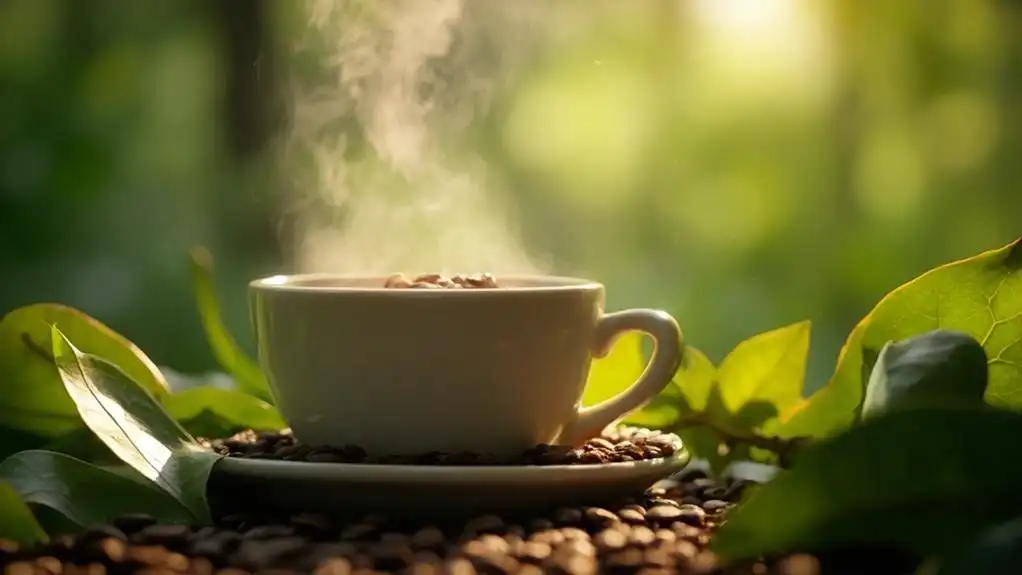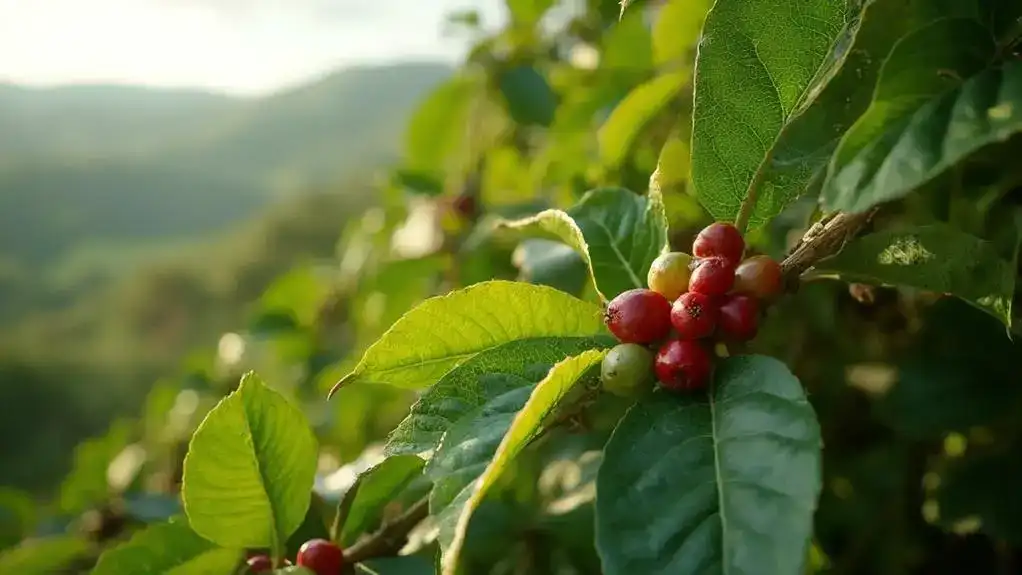Excelsa coffee contains a moderate caffeine level, typically between 0.8% and 1.2%. This makes it less intense than Robusta, which boasts higher caffeine content, and comparable to Arabica and Liberica. If you’re looking for a milder coffee experience, Excelsa provides a satisfying boost without the jitters that come from stronger blends. Its unique flavor profile includes fruity and floral notes, enhancing the overall drinking experience. Many enjoy its gentle lift, making it ideal for daily consumption. To grasp more about different brewing methods and user experiences, you’ll find additional insights helpful.
What is the Caffeine Content in Excelsa Coffee?

When it comes to caffeine content, Excelsa coffee sits in a moderate range, especially when compared to other types like Robusta and Arabica.
You’ll find that its caffeine levels are estimated to be lower than Robusta and similar to or slightly less than Arabica, making it a milder choice overall. Learn more about caffeine levels in cold brew coffee here.
This unique balance between flavor and caffeine makes Excelsa appealing for those seeking a satisfying coffee experience without the intensity of stronger varieties.
How Does Excelsa Coffee Compare to Other Coffee Types?
When comparing Excelsa coffee to other types, you’ll find that its caffeine content is generally lower than Robusta but similar to Arabica and Liberica. This makes Excelsa a mild choice for those who enjoy coffee without an overwhelming caffeine kick.
Understanding these differences can help you select the right coffee for your preferences.
- Excelsa vs. Arabica: Comparable caffeine levels, typically around 0.8% to 1.4%.
- Excelsa vs. Robusta: Robusta has a notably higher caffeine content (1.7% to 2.5%).
- Excelsa vs. Liberica: Both have lower caffeine levels than Arabica and Robusta, usually ranging from 0.8% to 1.2%.
Comparison with Arabica Coffee
Many coffee enthusiasts often wonder how Excelsa coffee stacks up against Arabica regarding caffeine content. Excelsa coffee typically has a caffeine range similar to Arabica, making it a milder choice while still offering a rich Excelsa flavor and aroma.
| Coffee Type | Caffeine Content (%) | Flavor Profile |
|---|---|---|
| Excelsa | 0.8% – 1.2% | Fruity, Floral |
| Arabica | 0.8% – 1.4% | Smooth, Sweet |
| Robusta | 1.7% – 2.5% | Bold, Earthy |
| Liberica | 0.8% – 1.2% | Unique, Smoky |
Comparison with Robusta Coffee
Excelsa coffee stands out in comparison to Robusta, particularly regarding caffeine content. While Excelsa has a moderate caffeine level, Robusta generally contains considerably more. This difference highlights Excelsa’s smooth flavor profile, rooted in its unique origins. Here’s a quick comparison of their caffeine content:
| Coffee Type | Caffeine Content (%) |
|---|---|
| Excelsa | 0.8% – 1.2% |
| Robusta | 1.7% – 2.5% |
Comparison with Liberica Coffee
If you’re curious about how Excelsa coffee stacks up against Liberica, you’ll find that both share similar caffeine levels, typically ranging from 0.8% to 1.2%. While the Excelsa flavor is often described as fruity and tart, Liberica offers a more floral and woody profile. Here’s a quick comparison:
| Coffee Type | Caffeine Content |
|---|---|
| Excelsa | 0.8% – 1.2% |
| Liberica | 0.8% – 1.2% |
Estimated caffeine levels in Excelsa coffee
When you’re exploring the world of coffee, you might wonder about the caffeine levels in Excelsa coffee. Unlike the more common varieties, Excelsa coffee is known for its moderate caffeine content, which is generally lower than Robusta and similar to or slightly less than Arabica. While exact figures aren’t well-documented, estimates suggest that Excelsa coffee falls within a caffeine range of about 0.8% to 1.2%.
Here’s a helpful comparison of caffeine levels:
| Coffee Type | Caffeine Content (%) | Flavor Profile |
|---|---|---|
| Excelsa | 0.8% – 1.2% | Fruity, tart, and rich |
| Arabica | 0.8% – 1.4% | Mild, sweet, complex |
| Robusta | 1.7% – 2.5% | Strong, bitter |
| Liberica | 0.8% – 1.2% | Unique, floral |
| Excelsa | 0.8% – 1.2% | Mellow, smooth |
The Excelsa flavor profile, with its fruity notes, often appeals to coffee enthusiasts looking for a unique experience. Its origins in Southeast Asia and Africa contribute to its distinct characteristics, making it an intriguing choice for those seeking a balanced caffeine option.
Why Excelsa Coffee is Considered to Have Moderate Caffeine Content
Many coffee enthusiasts appreciate Excelsa coffee for its moderate caffeine content, which strikes a balance between flavor and stimulation. Originating from Southeast Asia, Excelsa beans are often recognized for their unique flavor profile, featuring fruity and floral notes. This distinct taste, combined with its moderate caffeine levels, makes it an appealing choice for those who want a milder coffee experience.
Excelsa coffee typically contains caffeine levels comparable to Arabica, ranging from about 0.8% to 1.4%. While this is lower than Robusta, which can reach 2.5%, it places Excelsa in a comfortable middle ground. The moderate caffeine content is largely due to the specific growing conditions and unique bean composition of Excelsa.
As you explore Excelsa coffee, you’ll find that its caffeine content is neither overwhelming nor too weak, making it suitable for daily consumption. This makes it a great option for coffee drinkers who appreciate a flavorful cup without the jitters associated with higher caffeine levels.
Ultimately, Excelsa coffee’s moderate caffeine content allows you to enjoy its rich flavor while still feeling in control of your caffeine intake.
What Factors Influence Caffeine Content in Excelsa Coffee?

When it comes to Excelsa coffee, several factors influence its caffeine content.
You’ll find that growing conditions, such as altitude and soil quality, play a key role, along with how the beans are processed and brewed.
Understanding these elements can help you appreciate the unique characteristics of Excelsa coffee and how they affect its caffeine levels.
Growing Conditions and Caffeine Levels
Growing conditions play a crucial role in determining the caffeine levels in Excelsa coffee. One key factor is altitude effects. Coffee grown at higher elevations tends to have lower caffeine content. This is because plants produce caffeine as a natural defense against pests, and at higher altitudes, the cooler temperatures slow down plant growth, leading to less caffeine production.
Soil quality also greatly impacts caffeine levels. Rich, nutrient-dense soils provide the essential elements that coffee plants need to thrive, potentially influencing the amount of caffeine produced. Well-drained, fertile soils encourage robust growth, which can affect the overall composition of the coffee beans. In contrast, poor soil quality can stress the plants, possibly leading to higher caffeine levels as a survival mechanism.
Furthermore, climate variables, such as temperature and rainfall, can influence both the growth rate and the chemical composition of Excelsa coffee beans. Each of these factors contributes to the unique flavor profile and caffeine content of the coffee you enjoy.
Understanding these growing conditions can help you appreciate the complexities of Excelsa coffee and its caffeine levels even more.
Processing Methods and Their Impact on Caffeine
Processing methods greatly influence the caffeine content in Excelsa coffee. The way coffee beans are processed after harvesting, including drying and roasting techniques, plays a significant role in determining the final caffeine levels.
Different processing techniques can either enhance or reduce caffeine extraction from the beans. For instance, wet processing often results in a cleaner flavor profile, which might also lead to slightly lower caffeine retention compared to dry processing, where beans may retain more caffeine due to less exposure to water.
Roasting also impacts caffeine content; lighter roasts tend to have slightly more caffeine than darker roasts, as prolonged roasting can break down caffeine molecules. Consequently, if you’re looking for a specific caffeine experience, the choice of processing method is essential.
Additionally, the conditions during processing, such as temperature and humidity, can further influence caffeine extraction.
Brewing Techniques That Affect Caffeine Content
Several brewing techniques can greatly influence the caffeine content in Excelsa coffee. The methods you choose play an essential role in caffeine extraction, with various factors affecting the final result.
For instance, if you opt for a longer brewing time, expect a higher caffeine yield. This is because extended exposure allows more caffeine to dissolve into the water.
Water temperature also matters. Brewing at higher temperatures can enhance caffeine extraction, while cooler water may result in a milder cup.
Different brewing methods, like French press or espresso, can yield different caffeine levels too. The French press, with its longer steeping time, often extracts more caffeine compared to a quick espresso shot.
Grind size is another factor; a finer grind increases surface area, promoting better extraction. Conversely, coarser grinds may lead to less caffeine being extracted.
Lastly, the coffee-to-water ratio impacts caffeine content as well. A stronger ratio will yield a more caffeinated brew.
What Are User Experiences with Excelsa Coffee Caffeine?

When you try Excelsa coffee, you’ll likely notice its moderate caffeine strength, which many drinkers find pleasantly balanced.
Users often appreciate the rich flavor that Excelsa offers, especially in regions where it’s known as Barako, where the taste takes precedence over the caffeine content.
This combination makes it a satisfying choice for daily coffee consumption without being overly stimulating.
Perceived Caffeine Strength Among Coffee Drinkers
Many coffee drinkers find that Excelsa coffee strikes a perfect balance in caffeine strength, delivering a pleasant boost without overwhelming intensity.
Users often report that the moderate caffeine content enhances their coffee experience, making it an ideal choice for those who appreciate a rich taste profile without the jitters associated with stronger coffees like Robusta.
Excelsa’s unique characteristics make it appealing for various brewing preferences.
Here’s what users typically say about their experiences:
- Balanced Energy: You’ll likely feel a gentle lift, perfect for daily enjoyment without the crash.
- Flavorful Experience: The taste profile complements the caffeine, making each cup satisfying and enjoyable.
- Versatile Brewing: Whether you prefer pour-over or French press, Excelsa adapts well to different methods, enhancing your brewing ritual.
Excelsa Coffee as Barako: Flavor vs. Caffeine
Excelsa coffee, often referred to as Barako in certain regions, is celebrated for its robust flavor profile that stands out more than its caffeine content. Originating primarily in Southeast Asia, particularly the Philippines, this unique coffee variety offers a taste experience that many find rich and satisfying.
Users consistently highlight its distinctive fruity and floral notes, which can be quite complex compared to other coffee types.
When it comes to caffeine, the perception is that Excelsa coffee provides a moderate kick, making it a great option for daily consumption without the jitters associated with stronger coffees like Robusta.
Most drinkers appreciate that while the caffeine content is similar to Arabica, the emphasis remains on its flavor profile. This balance allows you to enjoy a bold cup while feeling comfortable with the caffeine levels.
In regions where it’s known as Barako, many coffee enthusiasts embrace Excelsa for its strong, unique flavor rather than its caffeine punch. This makes it a delightful choice for those who want to savor their coffee experience without overwhelming stimulation.
Conclusion
To conclude, Excelsa coffee offers a moderate caffeine content, typically ranging from 1.2% to 1.5%, which is lower than Robusta but higher than Arabica. This makes it an excellent choice for those wanting a satisfying coffee experience without excessive jitters. Curiously, about 30% of coffee drinkers report feeling more relaxed after consuming Excelsa, highlighting its unique appeal. Exploring Excelsa might just lead you to a balanced brew that fits seamlessly into your daily routine.

